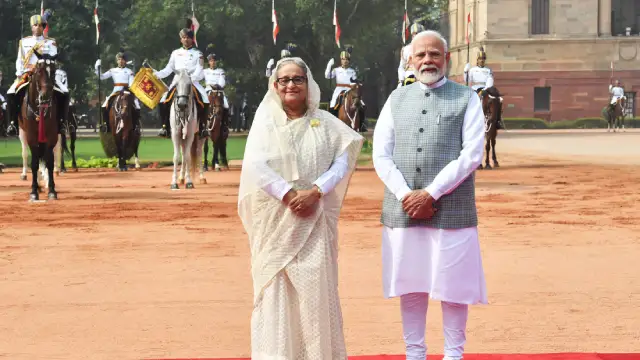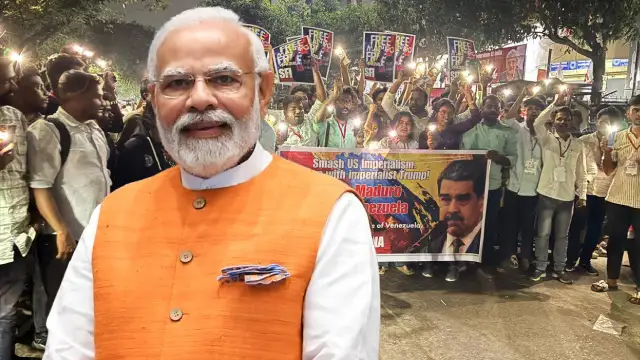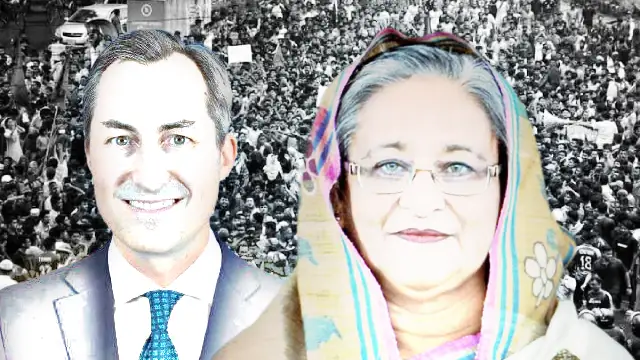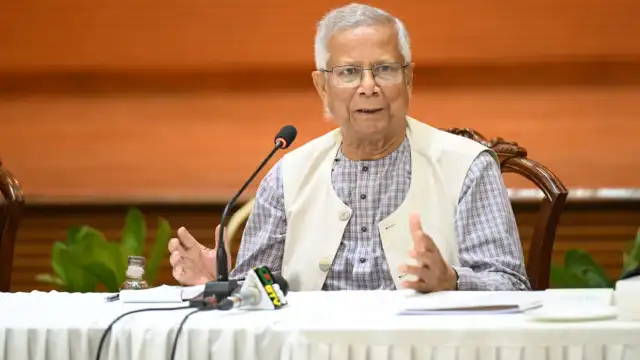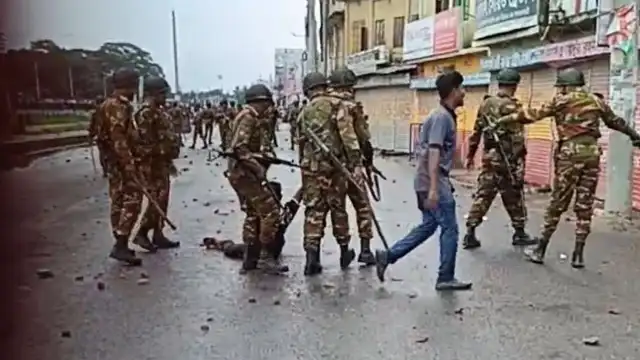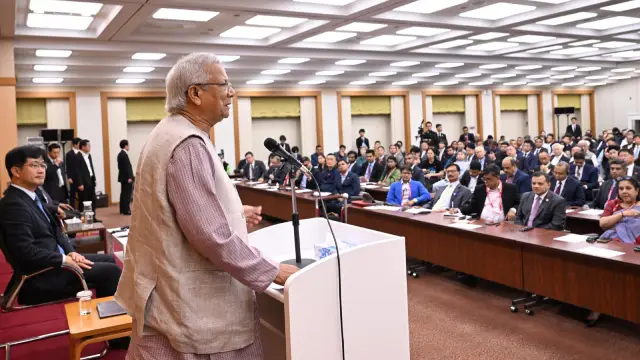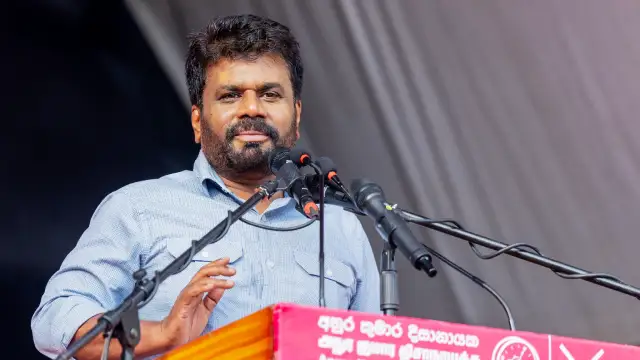It was 12.40pm on Monday, November 17th, when Justice Golam Mortuza Mazumder-led Bangladesh’s International Crimes Tribunal’s (ICT-BD) three-judge bench started reading the verdict in the much-awaited crimes against humanity case against former Bangladeshi prime minister Sheikh Hasina, former home minister Asaduzzaman Khan Kamal and former inspector general of police Chowdhury Abdullah Al-Mamun. Suspense peaked across the South Asian nation as the ICT-BD broadcast the session live on television and social media.
When the ICT-BD sentenced Ms Hasina and Mr Kamal to death for their roles in perpetrating massacres of students and youths protesting her sclerotic regime in July-August 2024, not merely the courtroom, but the entire country erupted with joy and celebrations.
While Bangladeshis, from the working class to students and youths, celebrate the ICT-BD verdict that condemned Ms Hasina and Mr Kamal to death, a pall of gloom descended on New Delhi’s South Block, where the Ministry of External Affairs (MEA) officials were keeping a close watch on the events of the day.
“As a close neighbour, India remains committed to the best interests of the people of Bangladesh, including in peace, democracy, inclusion and stability in that country. We will always engage constructively with all stakeholders to that end,” the MEA said in a statement.
Our statement regarding the recent verdict in Bangladesh⬇️
— Randhir Jaiswal (@MEAIndia) November 17, 2025
🔗 https://t.co/jAgre4elBV pic.twitter.com/wgM0gN3q1f
For India, which houses Ms Hasina since she fled Bangladesh on August 5th 2024, in the face of a student-led uprising that toppled her government with startling speed, the verdict isn’t merely something they can shrug off with sheer hubris.
India signed a bilateral extradition treaty with Bangladesh in 2013, which makes it compulsory for New Delhi to hand over any convict to Bangladesh. However, India has so far ignored the requests from the Bangladeshi government seeking her extradition. With an ICT-BD verdict, India’s scope for manoeuvring has been limited. However, as Ms Hasina refuses to accept the verdict, India will try to use loopholes in the agreement to deny extradition.
ICT-BD’s death sentence for Hasina stirs troubles for India
For India, losing Ms Hasina, the prime minister, who worked as New Delhi’s vassal according to her critics, was a major geopolitical catastrophe at a time when its relations with its other neighbours have reached a nadir.
Since coming to power in 2009, Ms Hasina had tightened her grip on power, jailing critics, taming institutions and treating dissent as sedition.
The explosion came in 2024, when students, job seekers and youth groups took to the streets in numbers that overwhelmed the police and shook the stability of her regime. Amid escalating violence and defections within the state, Ms Hasina abandoned the capital and sought refuge in India.
On November 17th 2025, the ICT-BD sentenced her to death for crimes against humanity, accusing her of ordering a brutal crackdown on protests in the final months of her rule. The fugitive former prime minister was tried in absentia. Although she denounced the proceedings from exile as politically motivated, her critics and a large number of Bangladeshi people have celebrated the victim.
Dhaka has now asked New Delhi to extradite her under the bilateral treaty signed in 2013. India has so far avoided taking a public position on Ms Hasina. Dhaka itself has not been pursuing the matter with vigour.
However, Monday’s verdict changes the equations.
In the late afternoon on Monday, sitting in the makeshift central headquarters of the newly-formed National Citizens Party (NCP), in the Banglamotor area of Dhaka, the party’s convener Nahid Islam demanded that Dhaka get Ms Hasina extradited within a month and execute the ICT-BD’s verdict.
As the interim government relies on the support of the students and youths who played a key role in the July-August uprisings in 2024, it becomes hard for Chief Advisor Muhammad Yunus to completely ignore their demands.
This means Dhaka will now again formally request New Delhi to hand over Ms Hasina, which the MEA will try to either reject or delay. However, the pressure will increase on New Delhi, which also relies on similar treaties with other countries to extradite culprits.
For India, this case has become an albatross around its neck, a diplomatic minefield combining the sensitivities of a fallen leader, a polarised neighbour and a treaty that binds New Delhi to cooperate in suppressing crime while also offering ample room for discretion.
In the present circumstances, Indian Prime Minister Narendra Modi’s government must decide whether to shelter Ms Hasina, hand her over, or find some third path that protects its interests while keeping relations with Bangladesh from fraying.
While the India-Bangladesh extradition treaty compels New Delhi to hand over Ms Hasina and other such fugitives, it’s the loopholes within the agreement that Mr Modi’s government can use to protect its long-term asset in the neighbouring country.
Hasina contests re-election
A parliamentary election boycotted by the main opposition returned the Awami League a large majority amid low turnout; critics said the vote lacked credibility.
Student protests ignite
Demonstrations began over education and quota reforms but quickly widened into a broader youth movement accusing Sheikh Hasina’s government of massacres, corruption and unlawful arrests.
Collapse of authority
Mass non-cooperation movement and clashes. The prime minister resigned and fled to India. An interim government was hastily formed to restore order.
Interim arrangements
Interim authorities froze assets, opened investigations into abuses, and requested India to consider extradition of the ousted leader.
Trials and sentencing
The International Crimes Tribunal convicted the fugitive former prime minister in absentia and handed down a capital sentence for crimes against humanity.
India’s treaty obligations—and the loopholes built into them
The extradition treaty between the two countries obliges each to hand over fugitives charged with or convicted of serious crimes. On paper, Ms Hasina’s conviction meets the basic threshold. The offences carry sentences well above the one-year minimum that defines an extraditable crime.
Moreover, Bangladesh has formally requested her return. India is therefore required to consider the plea seriously.
Yet the treaty contains several provisions that give India grounds to refuse.
One is the “political offence” exception. Though terrorism-related crimes cannot be sheltered under that clause, Ms Hasina’s case is entangled with politics at every turn. She was not charged with terrorism but with crimes against humanity linked to a mass protest movement that toppled her government.
India could easily argue that the alleged offences emerge from a context of political upheaval rather than ordinary criminality. This is what Indian foreign policy and legal experts have been arguing. Their arguments have gained momentum ever since Ms Hasina and her banned Bangladesh Awami League (BAL) cried foul.
Another clause allows refusal if the accusation “was not made in good faith in the interests of justice”. Critics of the tribunal, including international observers, say that trials in absentia, rapid proceedings and the charged political climate in Bangladesh raise questions about due process.
India’s courts have long held that extradition cannot be granted if the accused faces a real risk of political persecution or the denial of a fair trial.
In Ms Hasina’s case, the presence of the death penalty adds another layer of difficulty. India seldom agrees to extradite individuals to jurisdictions where execution is likely unless it receives explicit assurances that the sentence will not be carried out.
That India can refuse the request does not necessarily mean that it should. Every option carries strategic costs.
What if India hands Hasina over to Bangladesh?
Complying with Dhaka’s request would benefit India in three different ways.
Firstly, it will blunt the BAL’s critics’ allegations that Ms Hasina is an Indian puppet and New Delhi will do everything to protect her. Through her extradition, India will decouple itself from the banned BAL and save itself from future blame.
Secondly, this move will help Mr Modi’s government to defuse the propaganda that it’s hostile to Bangladesh. This will ensure that India will mitigate the risk of Bangladesh harbouring anti-India forces or joining hands with external powers against New Delhi’s interests.
Finally, it will show that India respects Bangladesh’s judicial processes even after the change of guard. It would remove an irritant in the bilateral relationship and spare New Delhi from accusations of sheltering a fugitive.
While these are India’s benefits in handing over Ms Hasina to Bangladesh, however, such a move would be extraordinary for New Delhi.
Risks associated with Hasina’s extradition
India has traditionally sheltered political exiles, from Sri Lanka’s Tamil leaders in the 1980s to Nepalese politicians a decade ago. Returning Ms Hasina would be seen as an abandonment of an ally who, during her long years in power, cooperated closely with India on security, regional connectivity and counterterrorism.
She dismantled the anti-India insurgent networks that had once found safe haven in Bangladesh and aligned her country more closely with Indian interests. Handing her over to a government that seeks to execute her would unsettle India’s friends elsewhere, who would doubt its reliability in moments of crisis.
Extradition would also carry domestic political risks. The optics of sending a former prime minister to likely execution would be quite risky for Mr Modi.
The Indian prime minister’s far-right Bharatiya Janata Party (BJP) and its parental body, Rashtriya Swayamsevak Sangh (RSS), the fountainhead of the global Hindutva movement, have projected Ms Hasina as a saviour of Hindus in Bangladesh. In reality, during her 15-year-long rule, anti-minority violence had spiked in Bangladesh.
The BJP and the RSS have been alleging that Mr Yunus’s government is run by Islamic fundamentalists who want to turn Bangladesh, which is officially secular, into an Islamic theocratic state. While they also want to undo India’s secular character, as enshrined in its constitution, to turn it into a Hindu theocratic state, they vehemently oppose the Bangladeshi Islamists taking a similar course.
Since Ms Hasina’s fall, the RSS has built a massive anti-Bangladesh campaign and stoked Islamophobia by projecting Mr Yunus’s government as an Islamist one. Moreover, Mr Modi himself had, time and again, taken up the issue of “Hindu persecution in Bangladesh” and raised it with US President Donald Trump, who personally detests the Bangladeshi chief advisor for his closeness with the Democrats. These developments take place while New Delhi denies international allegations regarding a consistent rise in violence against minority Muslims and Christians in India.
Now, handing over Ms Hasina to Bangladesh, while the RSS-BJP continue to amplify their anti-Bangladesh rhetoric, will seriously dent Mr Modi’s image as a strong leader promoting Hindutva and fighting Islam.
In short, complying with the request may help New Delhi buy goodwill with Dhaka, but can damage Mr Modi’s political image domestically.
If India refuses to hand over Hasina
In its statement, the MEA has not committed to assisting Bangladesh with the extradition.
India could cite the political nature of the charges in the ICT-BD against Ms Hasina. It can also cite flaws in the trial or the threat of execution as reasons to deny Ms Hasina’s extradition.
This is the most defensible position in law. It would also align with India’s strategic instinct to protect a long-standing asset.
Ms Hasina’s presence in India would allow India to keep its control over the BAL intact. Several BAL leaders and workers who have fled Bangladesh and have taken refuge in India’s West Bengal, according to media investigations. They are allegedly running an office from Kolkata, with tacit approval from Mr Modi’s government.
India aims to wait until an opportune moment emerges out of volatile Bangladesh, where it can again intervene and restore Ms Hasina’s government, critics argue. For this, Mr Modi may refuse to hand over Ms Hasina, experts believe.
The price would be friction with Dhaka. The interim government, as well as a new government following the 2026 elections, might accuse India of sheltering a criminal and meddling in its internal affairs.
Anti-India parties, from the far-left to the far-right, would exploit the issue. The prevailing anti-India sentiments will spike. New Delhi’s efforts to normalise ties will fail.
India’s refusal to extradite Ms Hasina could complicate cooperation on India-Bangladesh border management, migration, river-water sharing and energy. Although Bangladesh has so far relied heavily on India for trade, transit routes and security cooperation, the interim government has started diversifying diplomatic relations to reduce such dependence. This means, future Bangladesh governments will not rely heavily on India. This would give Dhaka strategic autonomy, while costing India an ally.
Thus, a formal refusal, despite being couched in legal language, will ultimately result in a long-term loss for India.
Choosing strategic ambiguity
This is the path India is most likely to follow. At least the ambiguous statement by the MEA points towards it. Instead of openly refusing Ms Hasina’s extradition request, India can delay proceedings through procedural questions, requests for additional evidence or extended legal reviews.
Most extradition cases between the two countries already move slowly; this one could be allowed to drift without conclusion.
Such an approach allows India to avoid a public rupture with Dhaka’s interim and future governments, while protecting Ms Hasina. It also gives time for politics in Bangladesh to evolve.
The student and youth movement that overthrew Ms Hasina has waned and fragmented into several camps.
While anti-Hasina sentiments unite Bangladesh’s mainstream political forces, across the spectrum, her execution will be a loss for the prominent political forces like the Bangladesh Nationalist Party (BNP), the NCP and Jamat-e-Islami, whose existence is based on an anti-Hasina axis.
Although all these parties have welcomed the ICT-BD’s verdict, India knows that these parties will find it difficult to build narratives if the former prime minister is executed following her extradition.
Thus, remaining ambiguous can help India buy some time but not a diplomatic victory in the region.
Balancing relationship
Despite the Hindutva camp’s anti-Bangladesh rhetoric, the Modi government’s nationwide campaign targeting Bengali-speaking people under the guise of weeding out so-called “Bangladeshi infiltrators”, India needs Bangladesh.
The two countries not only share a long border, across states, but also river systems, trade routes and have business ties. If Bangladesh relies on India on several counts, Indian corporates, including Mr Modi’s closest oligarch Gautam Adani’s conglomerate, also depend on Bangladesh.
Due to geopolitical realities, considering the secessionist movements in India’s north-eastern states, India must avoid confrontation with Dhaka over a fallen leader. While India has a responsibility to protect Ms Hasina, who has served New Delhi’s interests for decades, it can’t sacrifice its long-term interests at the cost of a lost asset.
The safest course for India is therefore neither compliance nor confrontation but time. By letting legal procedures play out at a glacial pace, India can avoid provoking Dhaka’s interim government as well as the future government, while ensuring Ms Hasina remains beyond its reach.
New Delhi can ensure that its diplomatic language soothes tempers, emphasising respect for Bangladesh’s judicial process while highlighting India’s own legal obligations and constitutional principles.
For now, India hosts Ms Hasina quietly, avoiding provocative statements and leaving the matter to diplomats and legal experts. It is an approach characteristic of Indian diplomacy when faced with combustible neighbours—move slowly, commit to nothing and allow events to shape themselves. In South Asia’s shifting political landscape, inertia often serves as a strategy.
Join our channels on Telegram and WhatsApp to receive geopolitical updates, videos and more.

